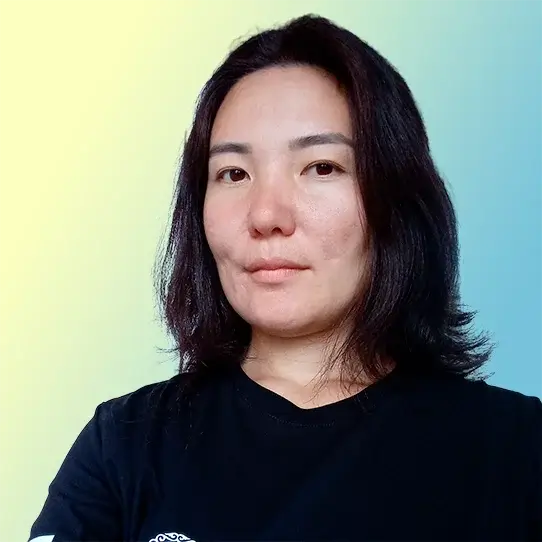— Saltanat, how did you find yourself with the project?
— It was not accidentally. But to be honest, I had not heard about the Angels of Freedom until the last spring. Since I am from the North of Kazakhstan, it was difficult to find such a fund there. Well, I’ll be honest (laughs). It was difficult for the fund to seep through there. I had never heard of this fund, but I followed the Help Ukraine Humanitarian Support Headquarters page on Instagram. I saw an advertisement that the Angels of Freedom project was looking for a recruiter and submitted my application.
I had to find people who could do something useful for the project. We were not just looking for volunteers who could make angels, we were looking for specialist volunteers: designers, operators, copywriters, etc.
— What are your responsibilities?
— For three months I combined several functions — I was both a regional coordinator and a recruiter. Now I am still involved in recruiting, but I spend less time on the development of regional representation.
— You said that it was difficult for the Angels of Freedom project to gain a foothold in the Northern Kazakhstan. Could you please explain why?
— It is densely inhabited by the Russian-speaking population and, hence, by people who have a different position in relation to Ukraine.
— Nevertheless, the Angels of Freedom project is now developing there? Do tolokas and fairs take place?
— Tolokas are held, but, unfortunately, we do not participate in fairs.
— Are these instructions coming from “above”?
— I don’t know where the instructions come from, but it does not work out well with fairs yet.ия, но с ярмарками у нас не складывается пока.
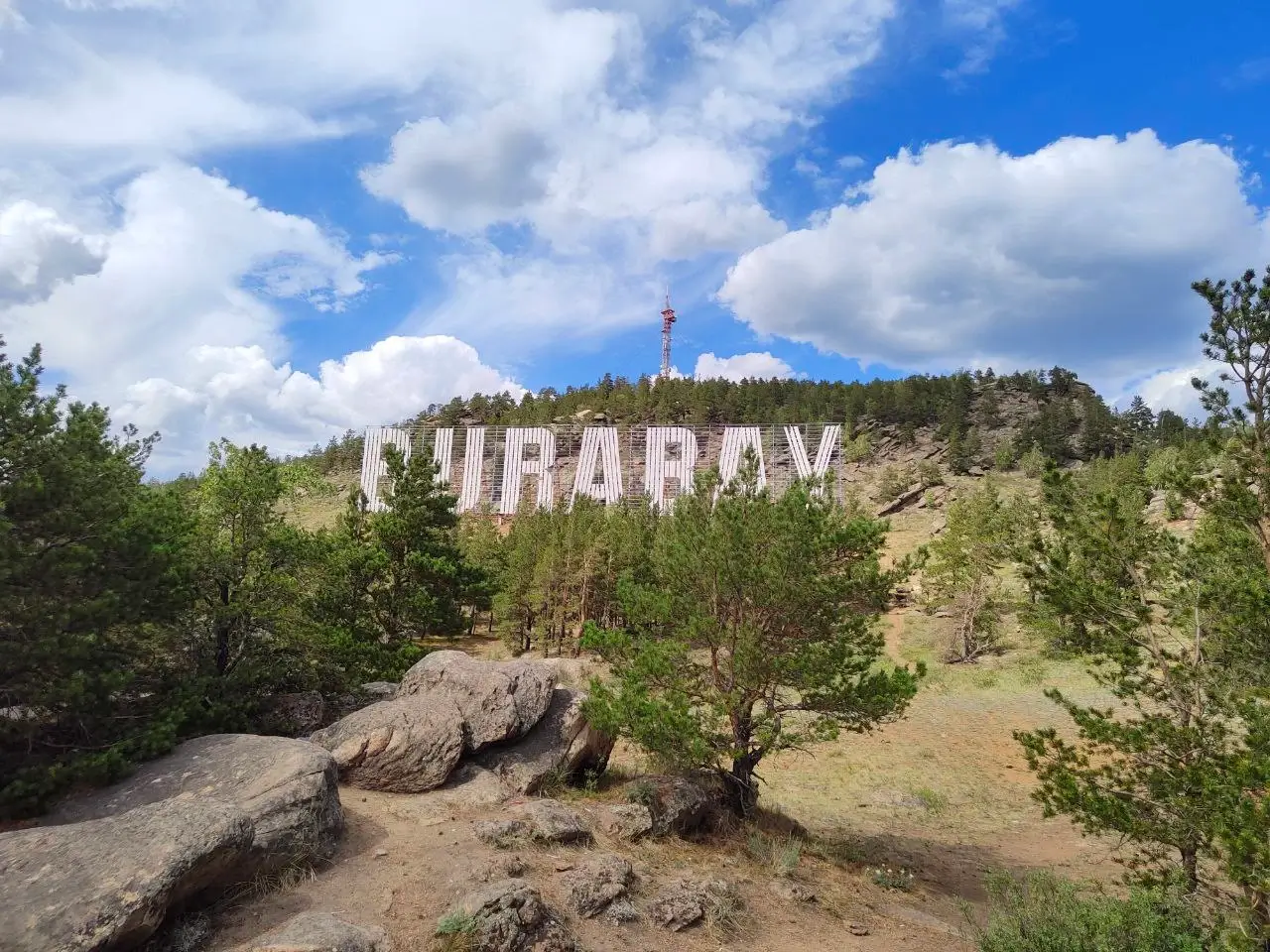
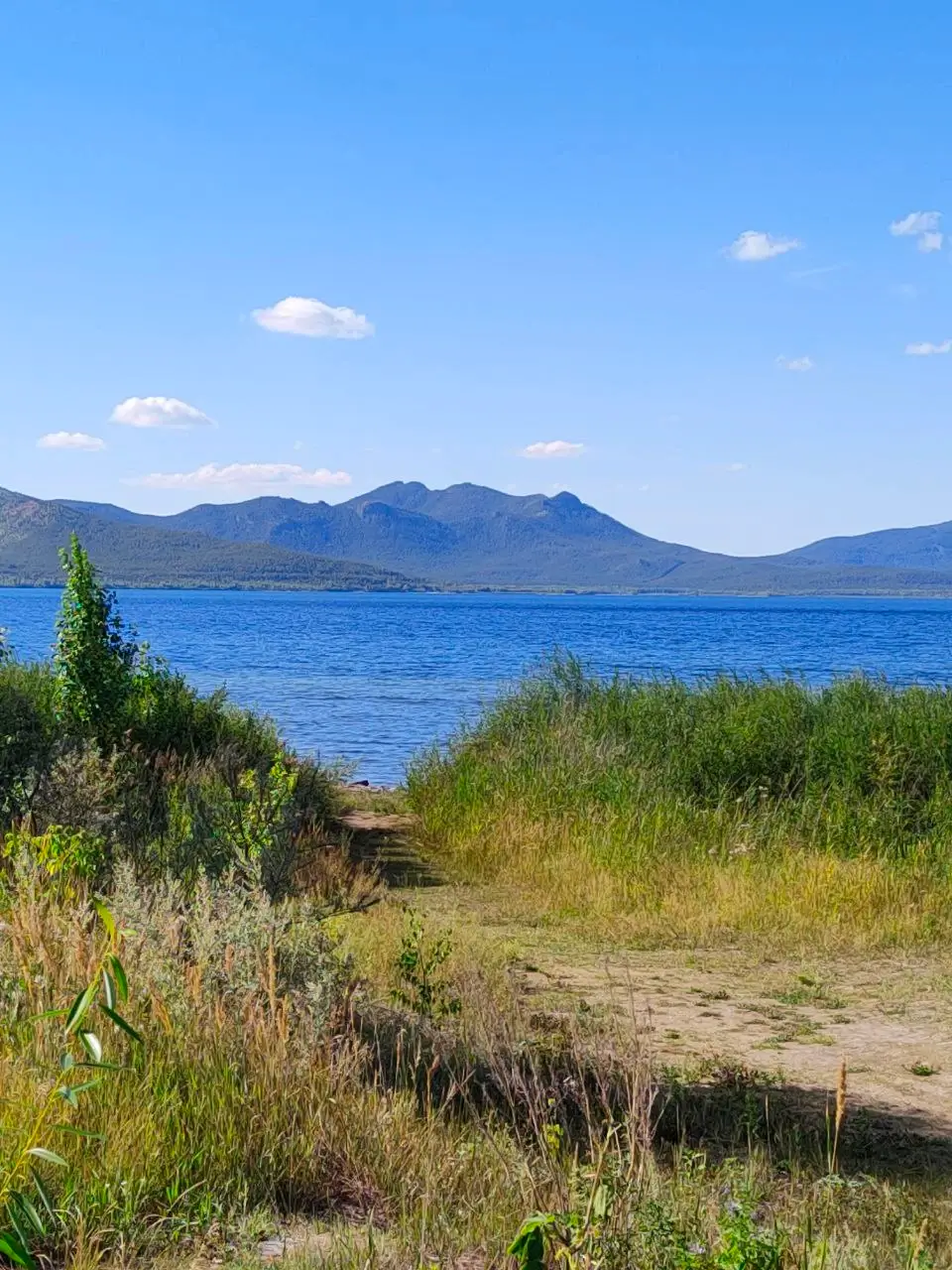
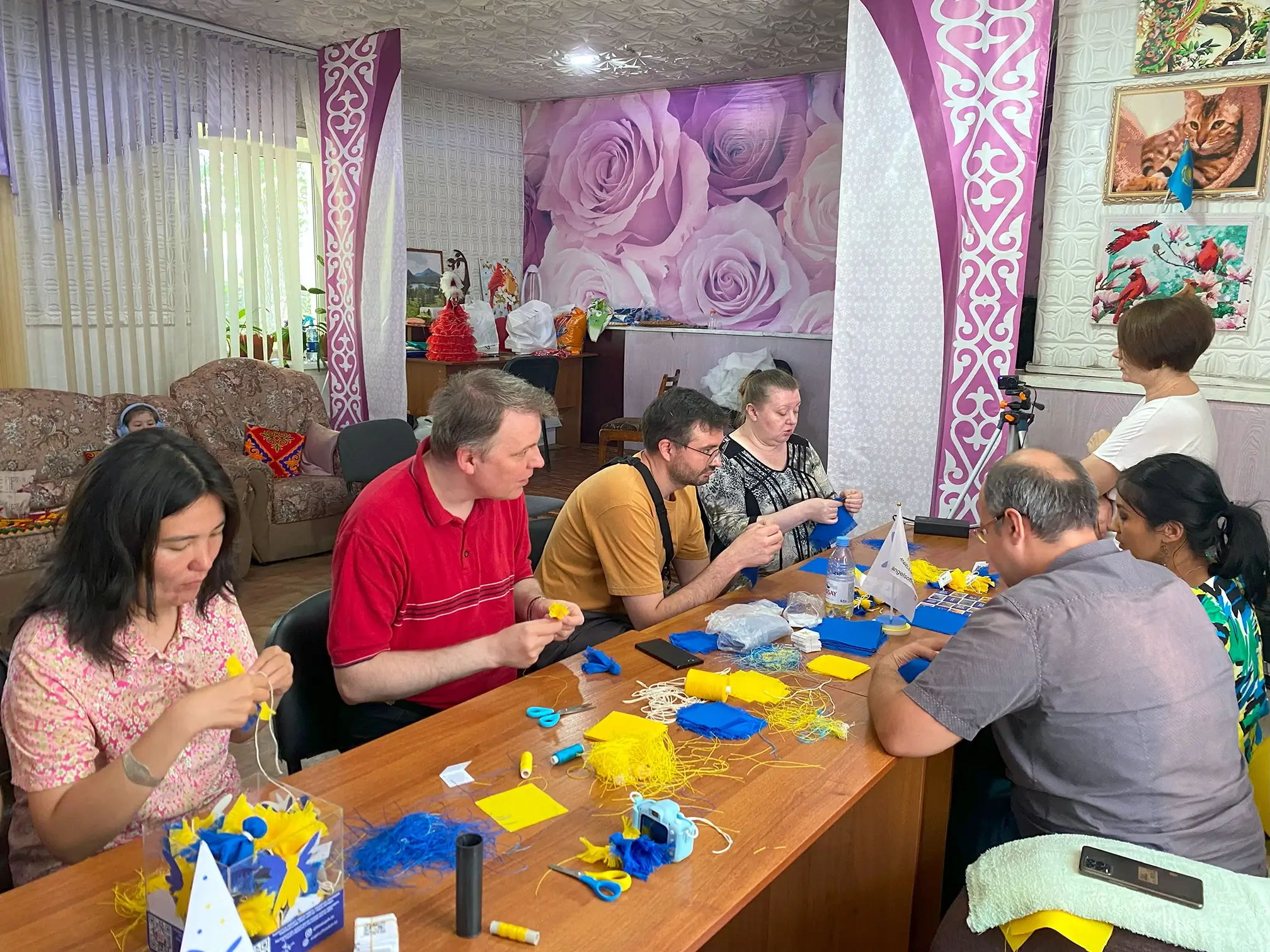
— When did the desire to help Ukraine come? Do you remember the moment when you realized that you wanted to do something?
— I’ll tell you a little background story. My mother is a very active person interested in politics. And on the eve of February 24, we discussed with her whether Russia would attack Ukraine. She said it wouldn’t do it. And I thought that most likely it would. And on February 24, when I opened Instagram, I saw people posting videos of the bombings. I have friends in Ukraine (we’ve never met, but we have communicated for work), and I wrote to them: “What’s going on with you?” They replied: “We are being bombed. We managed to hide our families somehow, but we stay here.” At that moment in time, there was nothing I could do to help them, because I was at a loss myself. I thought maybe this would be a one-off action, and then everything would calm down, that it wouldn’t go that far. But after several months it became clear that the conflict was getting worse. I had no idea how I could help. And at the Angels of Freedom project, my skills and abilities, my education and my desire were in demand. I initially counted on this.
Project volunteers have very strong motivation. This motivation helps when something doesn’t work out, when the project freezes or goes into crisis, or someone leaves.
— Why is it important for you to participate in action, why don’t you just want to limit yourself to financial donations?
— To be honest, when I found out that the tolokas include handicrafts, I said right away that me and handicrafts are very far from each other (laughs). You can’t count on me in this regard. At the first toloka I was so confused that I just stood and watched. It’s good that Iryna [one of the project’s founders — editor’s note] noticed this, came up to me and explained where to start. At the very first conversation with the founders of the project, I clearly stated what skills and abilities I have, and that I am ready to devote 24/7 to volunteer work in the next three months.
— What was your first impression of a toloka?
— In general, I never trust first impressions in my work. I try not to pay attention to emotions. But I should note that there was a very friendly atmosphere at the toloka. People who came really wanted to help in one or another way. They knew that, right now, they were not able to radically change the situation, but they could influence it indirectly in some place. There are very educated people among the participants, many of them are strong professionals in their field and each of them has certain weight.
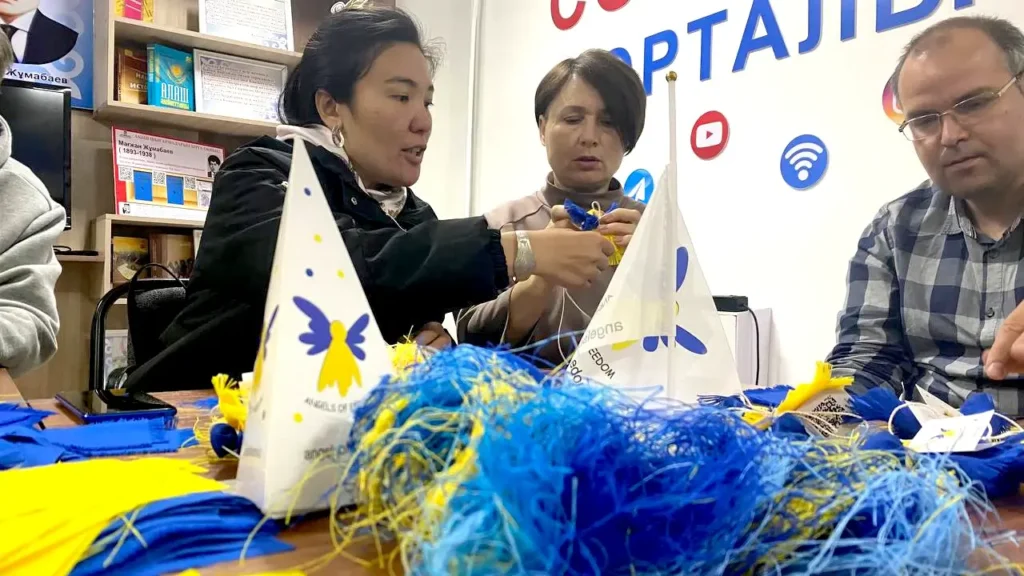
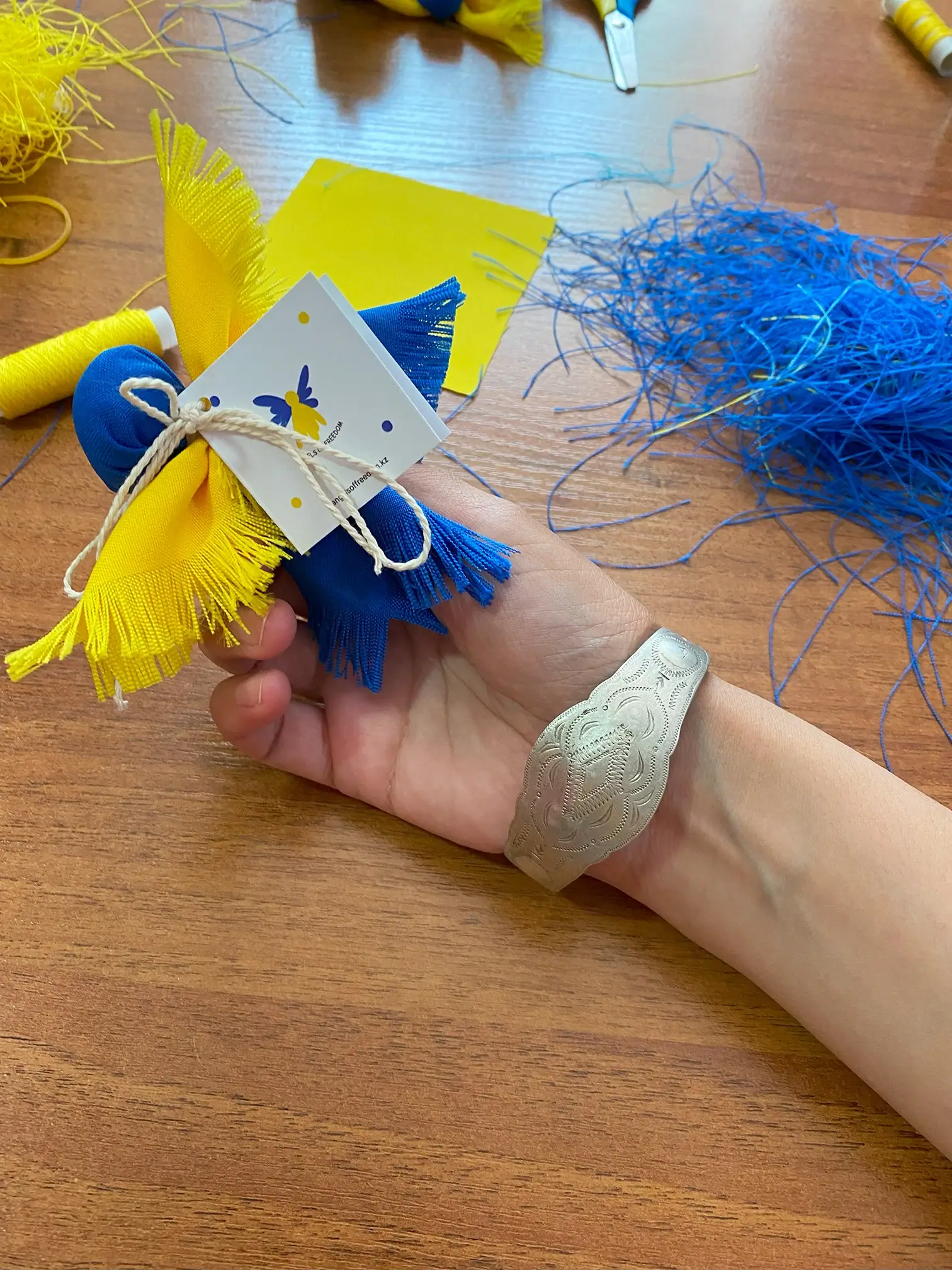
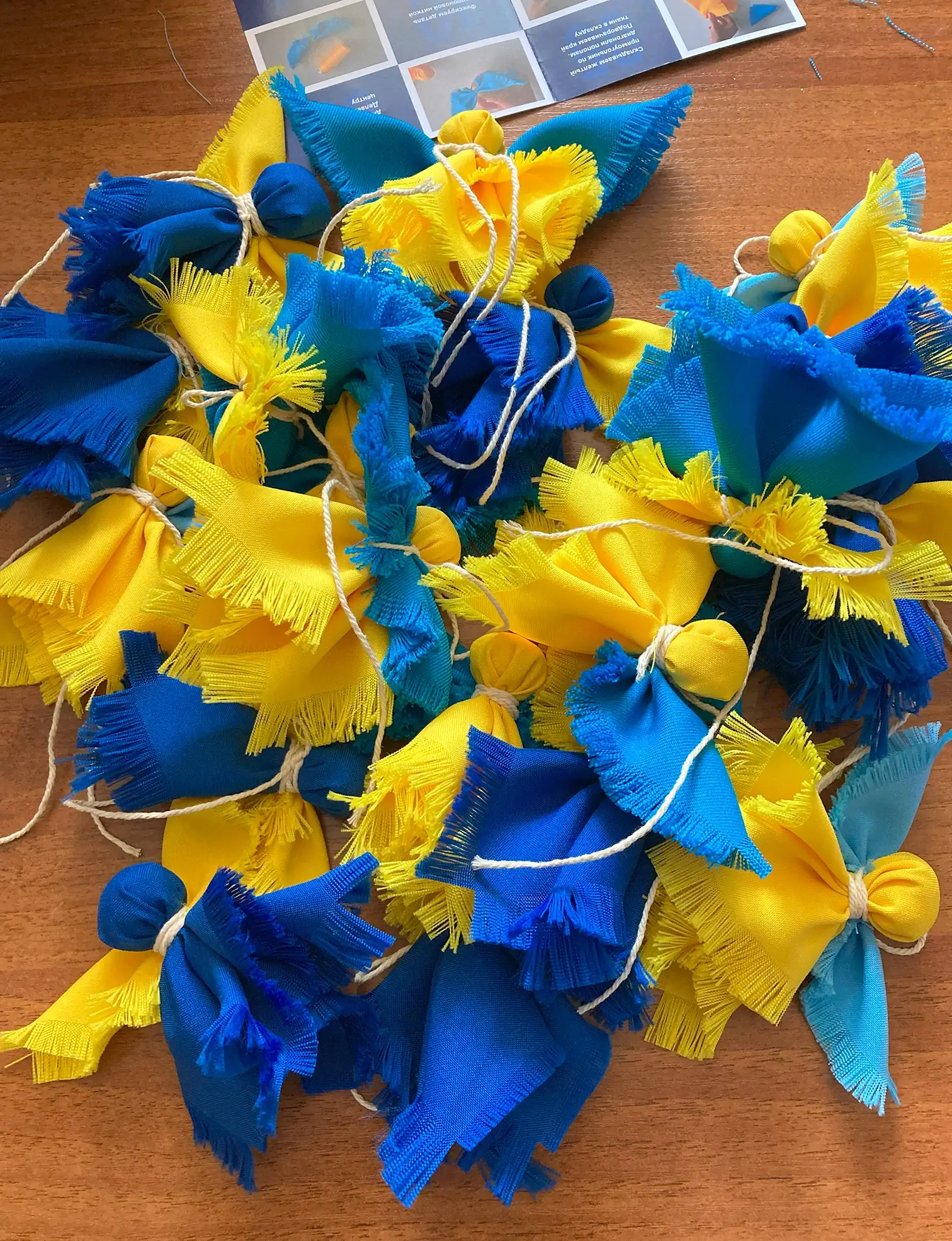
— How do your relatives feel about this part of your life?
— My family definitely supports me. My parents completely share my views and are very proud that I take part in this project. Moreover, if any additional help is needed, the whole family is ready to get involved.
— What about friends?
— First of all, I found more friends within the project. Secondly, you probably understand what region I’m from. Many people here are quite harsh about this my activity. I can’t say that they are directly negative, but I understand that it annoys them. Moreover, I was a regional coordinator while being a local and, let’s say, a representative of the “titular nation” which irritates [the pro-Russian citizens] twice as much. However, we even managed to enlist the support of a municipal deputy. She even came to our toloka. In our situation, it is a fairly good result.
— Saltanat, why, in your view, are many people in the North of Kazakhstan pro-Russian?
— I live in a region where most people have access to Russian TV channels. And every second resident has relatives in Russia. They are within the sphere of influence of that country. Physically they are here, but their sole and their mind live there. Fortunately, my mother is a very smart woman, she watches independent media and critically analyses the information, I inherited her views. We don’t have the TV working 24/7. We watch the local news just to know what laws have been passed. We are not susceptible to propaganda.
— Do you think that the influence of propaganda is the main cause?
— I see there three reasons. The first is very talented propaganda. And I should give credit to people who are making it, the propagandists, since I work in HR. They know how to present information in the way that people want, while still achieving their objective. I understand that they are very talented people, good speakers, good manipulators, they have a strong background. That is, I admit that they do their job superbly. Second, you should understand that people who are susceptible to propaganda want to be involved in that culture. This is the desire to “be there”, to share common values with people in Russia. This feeling of unity of views and positions makes them closer, if not physically, then mentally. If propaganda would say that “this is not blue, but yellow,” they would share this view. And the third reason is material. I heard from people that their relative went to war which means he will earn some money. They talk about it very dry and calm way. I think that they even have a sense of pride: “he serves a good cause, but they will also throw in some money.”
— Taking into account the specificity of your region, have you encountered any difficulties in organizing tolokas?
— When I first talked to Iryna and Yevgeniy, they said that they were going to hold a toloka in Shchuchinsk, and added me to the organizers’ chat. I was the only local person there. I wrote: “Guys, let’s meet and choose a place for toloka.” But when I was going to the meeting, I was scared. Promoting such a triggering theme in a such a region still bears certain risks. I thought that all this could end up very sadly. I walked my way and thought: “Should I, maybe, turn off? Come up with some reason.” But when a person retreats once, he then develops the habit of back-pedalling. So, I decided to go anyway, at least to start. When I overcame that first fear, it had never popped up again. I am confident in my views. Some people will be along the way with me, and some will not. If a person does not share my point of view, I do not hold on to him or her.
— Do you now have a local community of volunteers in Shchuchinsk that helps you?
— Yes, there is already a core group that regularly conducts tolokas. I was there for three months (then I moved to another city) and during this time, the local community of volunteers was formed. We even tried to infiltrate local fairs and the local newspaper. In other words, we used various promotion methods. We visited local businessmen, some of them came to our toloka, and we still maintain communication with them. Moreover, in Shchuchinsk we produced the largest number of angels in comparison to other regions except Astana.
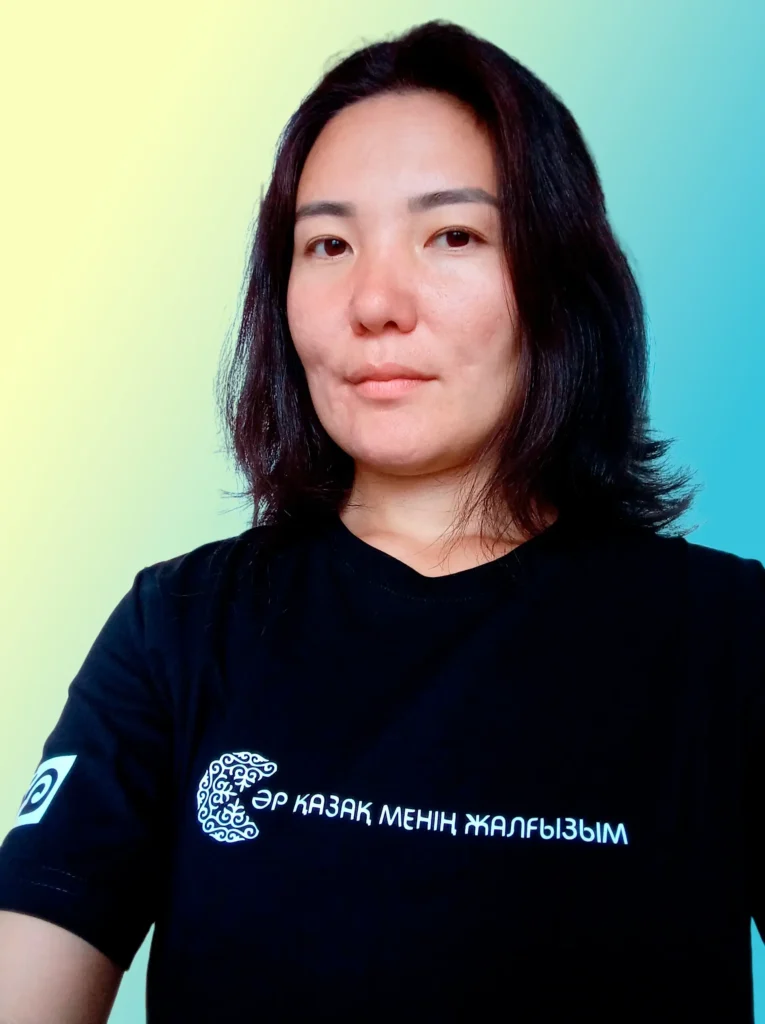
— Were there any other important events that happened to you during your volunteer work?
— Prior to that, I had not participated in such large projects, I had not worked on such a scale. Therefore, I am very grateful to the project for the opportunity to prove myself. This experience taught me a lot of things. I learned to accept people as they are. Since I was a regional coordinator and also a recruiter, I met people with different views. And you had to be able to handle objections. I couldn’t make people, change their mind but that wasn’t my goal. I had to find people who could do something useful for the project. We were not just looking for volunteers who could make angels, we were looking for specialist volunteers: designers, operators, copywriters, etc. And we filled almost all vacancies.
— It looks like the specialist volunteers are no longer needed now?
— Look, volunteer activity goes in waves. A person comes and helps for 2–4 months, but he will rarely give his all for the whole year. For project fund to develop, it is necessary for a person to devote 6–8 hours a week to volunteer activities. And there are tasks that need to be performed daily — for example, those related to social networks, that is, a person must be constantly in touch. Therefore, volunteers are always wanted.
— Could you name the most positive, inspiring event that occurred while you participated in the Angels of Freedom project?
— There are a lot of them. I am pleased every time I find volunteers. Before me, they were looking for them, in my opinion, using questionnaires. I realized that this approach meant: “good if it comes, if it doesn’t come it won’t.” But I would sit down and write in a personal message that I was such and such person, representing such and such project, and was ready to talk at any time. I had conversations at one o’clock in the morning and at two. Volunteers were not always based in Kazakhstan; they could get involved remotely, or it was simply more convenient for them to talk after 11 pm. It was the so pleasant that a new person contributed something to the project, when the time searching for this person was not wasted, and when the result was positive.
— What gives you the energy to continue and makes you do something for the Angels of Freedom every day? Is it connection to people who live in Ukraine?
— I don’t think that if I didn’t have friends in Ukraine, I wouldn’t be doing this. I’m not 15 years old, when you become interested in something just because a person you know is doing it. I believe that when a neighbour attacks a neighbour and rejoices at violence, it is not normal. Today it could be Ukraine, tomorrow it could be Kazakhstan, the day after tomorrow it could be Georgia. It’s like playing Russian roulette: you don’t know who the gun will point at. Yes, my friends living in Ukraine sent me videos of the liberated territories. It motivated me even further. Because I believe that if you have relations with someone you are responsible for this person. The closer is your communication the more responsibility, less intensive communication means less responsibility. But in any case, there is responsibility… I understand that if Russia wins, 40 million people will become slaves of one big country. And it is clear what will happen to the Ukrainians for their disobedience, for their desire to be themselves and make their own choices if Russian troops enter there in full. I don’t understand why the country that gave the world Chekhov and Dostoevsky can feel joy about violence and be proud of it. Have you ever happened to buy a ticket to the Bolshoi Ballet? When it tours abroad, the tickets are sold out six months in advance. And I simply don’t understand how people who have such a potential, such a culture, who have shown the world how developed and talented they can be, can simply deify violence against their neighbour. This remains a mystery to me. Either this is a part of the national character, or there is something that I simply don’t know. This probably won’t be included in the interview (laughs).
“Angels of Freedom” is faith in the best and specific steps towards peace in Ukraine. For Kazakhstan, supporting Ukrainian children is a manifestation of civic position, a position of non-acceptance of violence.
— How did participation in the project change you?
— I am very grateful that the project and myself have met. As I already said, I learned to perceive people as they are. I became more confident. Because people’s reactions are different, they don’t always wait for you with open arms and say: “I will help.” They can answer you rudely, and they can go on to explain you who are you and who’s Bandera. Such things happen as well. There are people who ask why don’t we help local schools: “Aren’t there problems in Kazakhstan?” There are people who generally cannot understand why volunteer help is needed. There were questions about whether I was getting paid. I have become more confident in what I do. Not even as a volunteer, not as a professional, but as a person. I really like Yevgeniy and Iryna. One thing I like about them is that they know how to love. This is not given to everyone. There are people who love because of some personal goals or to close some of their childhood gestalts. And given that Iryna and Yevgeniy are dealing with a very sensitive topic, this is admirable. You should also take into account that volunteers burn out. They get tired, they lose the desire to do anything. It is not because they are bad or not good enough. There just comes a moment in time when the resources are exhausted. This is fine. Everyone has his/her own ceiling: some can run the distance for two months, some for three, some for a year. This is why we have created a psychological service at the project: we have a psychologist who provides consultation sessions on Thursdays.
— What do you think it means to be able to love?
— I believe that love always comes despite everything. Being far from their homeland, in a society where this topic divides people into two camps, the founders of the Angels of Freedom project still continue to help their people, Ukrainian children. Despite some threats, negativity, hate… The same can be said about volunteers. I don’t know exactly how things turned out for everyone, but from my own experience I admit that some of their acquaintances could have turned their backs on them. These are our realities. And I like their civic position and inner courage. The courage to follow your views, your ideas, your faith in the best.
— Why do you think the Angels of Freedom, a foundation that relies only on voluntary and free efforts, continues to operate for more than a year?
— Project volunteers have very strong motivation. This motivation helps when something doesn’t work out, when the project freezes or goes into crisis, or someone leaves. There is a clear understanding: what you are doing is (a) right and (b) necessary.
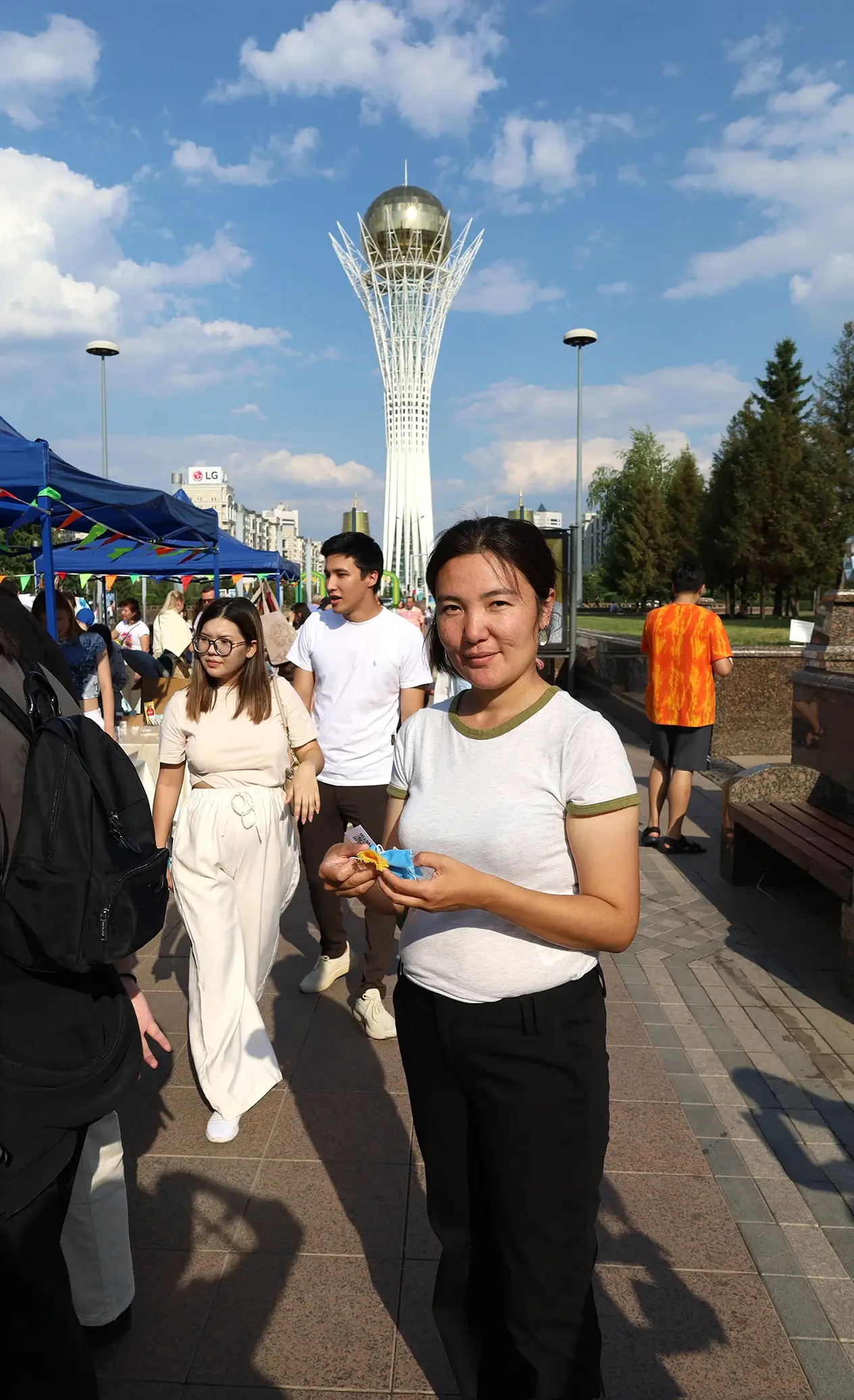
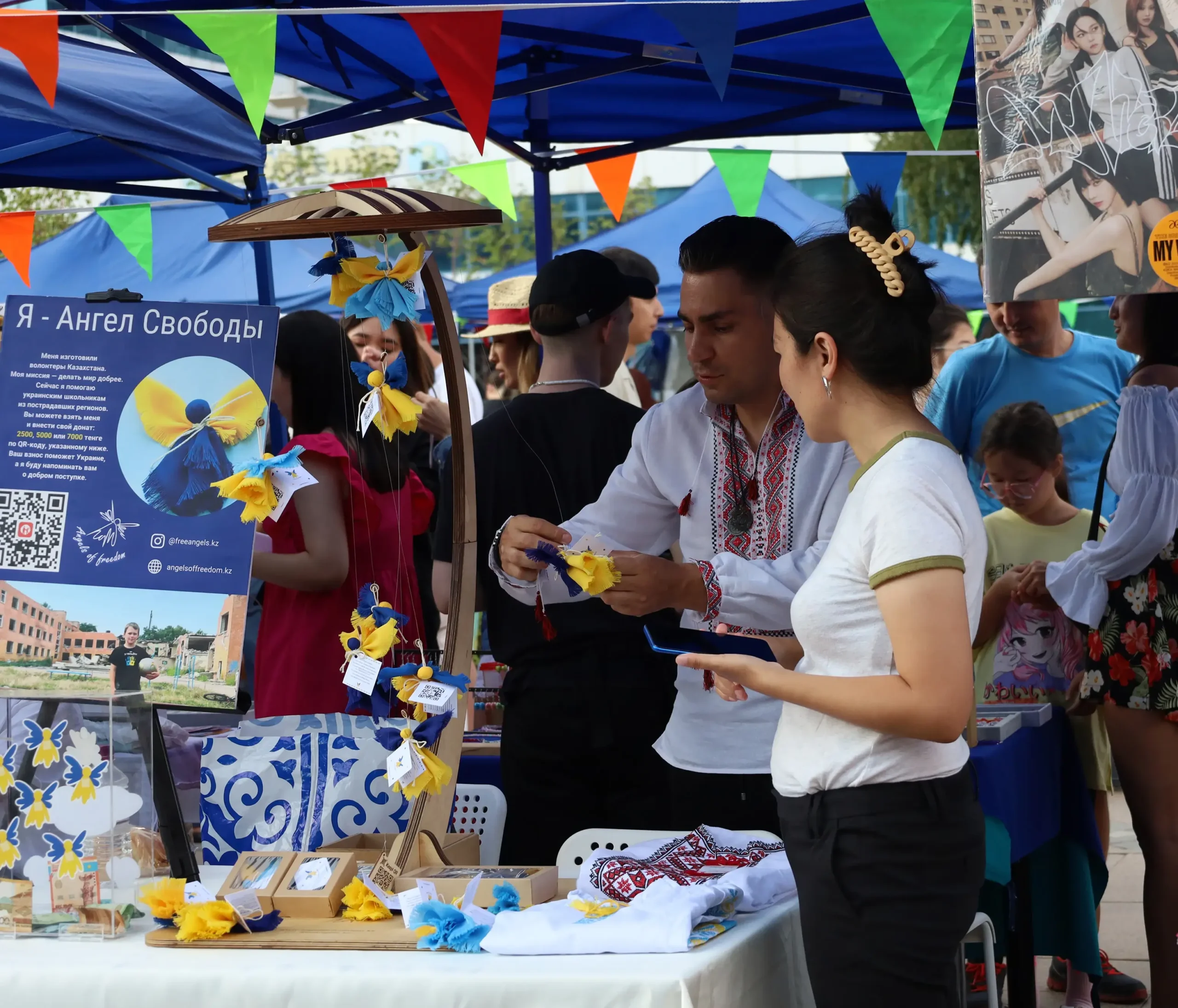
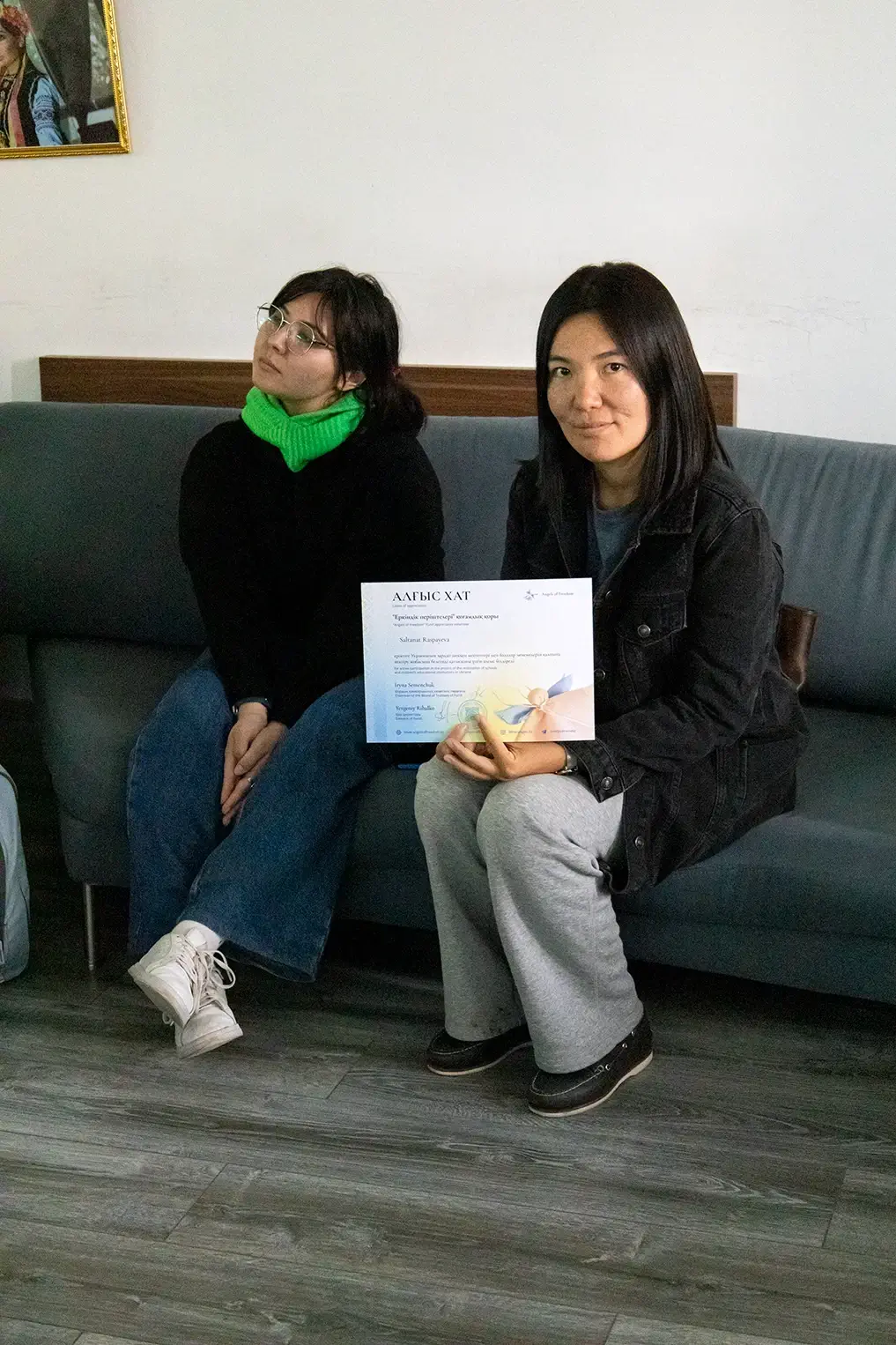
— What would you advise those people who sympathize with the Angels of Freedom, are considering the project, but do not yet dare to become active participants?
— I would wish them determination. Until you do it, you’ll never know if it’s worth it or not. You can think for hours, build arguments, hypotheses, but until you try, you won’t understand what it is. If you doubt anything, do a little research. Collect basic information about the project: where, when, by whom it was founded, ask about financial statements. These are all appropriate questions. Many volunteers, when they talked to me, asked how clean and transparent the project is, and whether there were contracts. We want to show that we don’t just send money to Ukraine, we have a specific agreement with a specific volunteer organization in Ukraine that patronizes a specific school or kindergarten, and that only after the conclusion of the agreement we begin to collect money. And then look at the results, the project already has demonstrated positive results of its work, it has existed for more than a year, which means it has been verified. I think it’s also worth talking to volunteers and founders. I know Yevgeniy and Iryna, they are always open to dialogue, always ready to talk with a person who hesitates.
— Saltanat, please continue the phrase “Angels of Freedom are…”.
— This is faith in the best and specific steps towards peace in Ukraine. For Kazakhstan, supporting Ukrainian children is a manifestation of civic position, a position of non-acceptance of violence. And for volunteers, this is an opportunity to find a strong community of people, and most importantly, people who are ready for action, ready to help.
